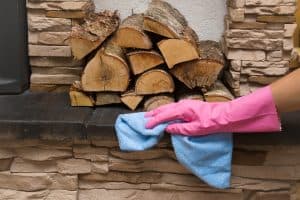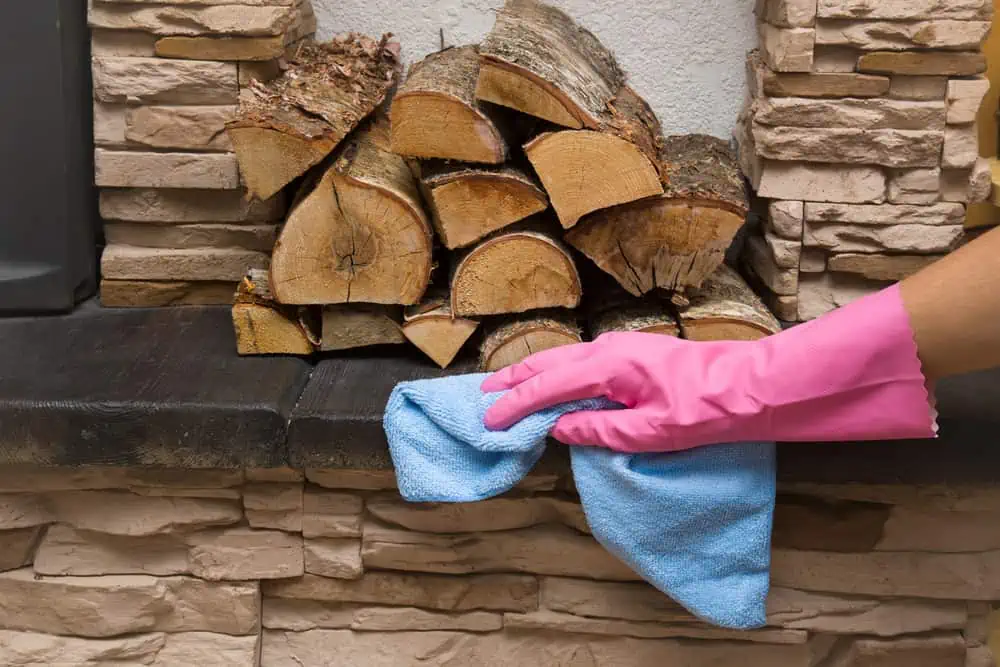Wood-burning fireplaces are warm, cozy and attractive; however, they require regular maintenance or else the penalties could become quite severe. One of the most important dangers of a wood-burning stove or fire is the development of creosote, a chemical that can accumulate on the inner parts of chimneys and flues. You need to do regular cleanings and inspections, ideally by using a professional chimney sweep. A regular chimney clean out will stop the buildup of creosote, and you can prevent the buildup yourself! You can clean out your chimney by using chemicals that will help you to make an effective chimney clean out.
Increase Efficiency with Chimney Clean Out
 Creosote and soot cause chimney fires and they can also create blockages. They intervene with the safe and environmentally-friendly operation of the hearth and chimney. A fireplace does not burn or heat as well if there is not a perfect flow of combustion gases up and out of the chimney. So, you can increase the efficiency of your chimney with an effective chimney clean out.
Creosote and soot cause chimney fires and they can also create blockages. They intervene with the safe and environmentally-friendly operation of the hearth and chimney. A fireplace does not burn or heat as well if there is not a perfect flow of combustion gases up and out of the chimney. So, you can increase the efficiency of your chimney with an effective chimney clean out.
What is Creosote?
Creosote is a tarry substance that forms when wood burns and is carried up the internal of a chimney as part of the smoke. The creosote collects on the inside of the chimney and traps carbon, commonly called soot, and the combination bakes against the inside of the chimney. Not only does this process cause a huge airflow problem, but it is also very flammable. A chimney furnace is dangerous and can lead to the destruction of your chimney, or even your home.
Perform a Chimney Clean Out with Warn Fires
One way to start your chimney clean out is to begin by constructing a warm fire and combine with compounds designed to get rid of soot and creosote through this controlled burn. This option is one of the easier ways to do a thorough chimney clean out, but it is also one of the riskier options. It’s important to remember that you are starting a fire and adding chemical compounds, so proceed with caution.
Use Chemical Solutions for Your Chimney Clean Out
There are many chimney clean out solutions that are available commercially. These solutions are not supposed to be used in chimneys that already contain heavy deposits of soot and creosote. Chemicals such as sodium chloride, or table salt, are sometimes used as a chimney clean out solutions. These chemical substances combined with water can dissolve small amounts of creosote when sprayed up into the chimney. Sodium chloride is corrosive to metal and is not advocated for metal chimneys. Cleaners that contain copper sulfate will coat any soot in the chimney and act as a catalyst to enable soot to burn away at lower than normal temperatures.
Sodium Chloride as a Chimney Clean Out Solution
Sodium chloride, also known as table salt, is an easy chemical that is almost effortless to find. Put a little salt in the fire whilst it is burning. The salt combines with the water in the burning wood to create a vulnerable acid that travels up the chimney and dissolves small amounts of creosote. This method needs to be used with care to make an efficient and long-lasting chimney clean out. It must not be overdone and must not be used in a metallic chimney, as the acid can interact with the metal and cause corrosion.
Copper Sulfate Makes for an Effective Chimney Clean Out
When selecting a commercially made chimney cleaner, one of the most high-quality components is copper sulfate. This compound coats and interacts chemically with the soot embedded in the creosote inside of your chimney, and helps it to burn away at a lower temperature than is usually required. However, like desk salt, copper sulfate combines with water and creates sulfurous, or sulfuric acid. This acid can harm the interior of your chimney, so it must be used with care while doing a chimney clean out.
While chemical cleaners can stop the buildup of creosote, the only way to effectively eliminate creosote is to manually scrub the internal portion of the chimney with a proper brush. Chemical cleaners should never be your sole cleaning technique while doing your chimney clean out. In addition, the overuse of these cleaners can harm your chimney, specifically metal-lined chimneys, and can minimize the lifespan of your chimney or flue. An ounce per week is usually sufficient. Read all instructions thoroughly before using any chemical cleaner.
We have professionals who can give you tips on performing an effective chimney clean out. Please fill out the form below and find out how to make an effective chimney clean out.

